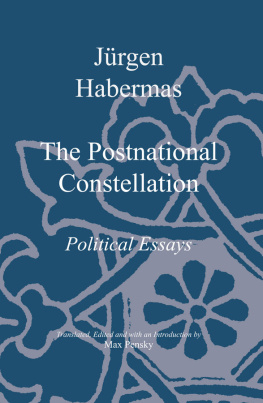
Contents
German text: Copyright 1973 by Suhrkamp Verlag, Frankfurt am Main
Introduction and English translation: Copyright 1976
Heinemann Educational Books
Legitimation Crisis was first published under the title
Legitimationsprobleme im Sptkapitalismus in 1973 by Suhrkamp Verlag
First published in Great Britain by Heinemann Educational Books 1976
Reprinted 1979, 1980, 1984
First published in 1988 by Polity Press
in association with Blackwell Publishers Ltd.
Reprinted 1992, 1997, 2004, 2007
Polity Press
65 Bridge Street
Cambridge CB2 1UR, UK
Polity Press
350 Main Street
Malden, MA 02148, USA
All rights reserved. Except for the quotation of short passages for the purposes of criticism and review, no part of this publication may be reproduced, stored in a retrieval system, or transmitted, in any form or by any means, electronic, mechanical, photocopying, recording or otherwise, without the prior permission of the publisher.
Except in the United States of America, this book is sold subject to the condition that it shall not, by way of trade or otherwise, be lent, re-sold, hired out, or otherwise circulated without the publishers prior consent in any form of binding or cover other than that in which it is published and without a similar condition including this condition being imposed on the subsequent purchaser.
ISBN: 978-0-7456-0609-5 (pbk)
A CIP catalogue record for this book is available from the British Library.
Printed and bound in Great Britain by Marston Book Services Limited, Oxford
For further information on Polity, visit our website: www.polity.co.uk
Translators Introduction
Jrgen Habermas is the most influential thinker in Germany today. Picking up where Adorno left off in his exchange with Popper, he became the central figure in the Positivismusstreit that dominated German philosophy and sociology in the sixties. In short, Habermas has shown himself to be possessed of an astonishing range of interests and competence; and he has succeeded in formulating and developing a unified, systematic perspective in which all this knowledge has its place. Thus, as seasoned an observer of Western intellectual life as George Lichtheim could remark of him in 1969 (that is, before the publication of much of his important work):
The baffling thing about Habermas is that, at an age when most of his colleagues have painfully established control over one comer of the field, he has made himself master of the whole, in depth and breadth alike. There is no corner-cutting, no facile evasion of difficulties or spurious enunciation of conclusions unsupported by research: whether he is refuting Popper, dissecting the pragmatism
Readers should be forewarned that this last remark is an exaggeration. Habermas can be quite difficult to read, and the present volume is a case in point. It makes unusual demands on the reader, assuming some familiarity with a wide range of disciplines (from economics to ethics), authors (from Kant to Parsons), and approaches (from systems theory to phenomenology). As stated in the authors preface, the intention of the book is a clarification of very general structures of hypotheses relating to the dynamics and development of contemporary capitalism. Habermas aim is no less than that of surveying most of the important literature on advanced capitalist society and organizing it around a continuous line of argument. However, it is extremely important that the reader take Habermas at his word on the status of the argumentit is meant as a preparatory clarification of the enormously complex issues involved, preparatory, that is, to the empirical research required for their further resolution. The argument makes no claim to finality; certain important questions are left open; and there are numerous indications of the precise points in the argument that call for as-yet-unavailable empirical data. Lest these cautions be taken as a subtle strategy for avoiding criticism, readers should be informed that much of the empirical research in question is already underway at the Max-Planck-Institut zur Erforschung der Lebensbedingungen der wissenschaftlich-technischen Welt.
At its own level, however, that of a dialectical consideration of hypotheses relating to the dynamics of organized capitalism, the argument does make a claim to correctness. To follow the twistings and turnings of this argument, to appreciate the force of points often made in the form of summaries of broad areas of research or in the form of a new direction for an ongoing discussion, requires a great deal of readers. If they are able to meet these demands, they will be appropriately rewarded. Into the great, unformed mass of social and philosophical literature on the character and prospects of contemporary Western society a systematic order is introduced; hypotheses are examined, criticized, revised, and reinterpreted; resolutions of outstanding issues are proposed and unresolved issues stated with admirable clarity with an indication of the information needed to resolve them.
In addition to the general difficulties attendant on the vastness of the literature involved, the intricacy of the line of argument sustained throughout the book, and its tentative, open character at several points, there are three further aspects that may prove troublesome to the Anglo-American reader. First, Habermas examines at some length a variety of theories of economic crisis that have emerged from the Marxist tradition. His discussion, while clear enough in itself, does presuppose some familiarity with the basic ideas of this tradition. This is, perhaps, less of a problem today than in the past. In England and America, there is a growing interest in Marxist economic and political theory. Many of the classic works have been translated, and a number of new studies have recently appeared. For the rest, the reader will find references to the most important literature in the text.
A secondand extremely importantaspect of Habermas argument is his discussion of systems theory. From his perspective, this includes not only the narrowly cybernetic approaches to society, but functionalist and structural-functionalist approaches as well. His principal targets here are clearly Parsons and Luhmann. Anglo-American readers may be expected to have some acquaintance with the work of the former as well as with the basic categories and methods of socio-cybernetics. The work of Niklas Luhmann, the leading German systems-theorist, is, however, largely unavailable in English. A prolific writer, Luhmann has radicalized the functionalist approach and applied it to a vast number of areas (including law, economics, government, education, and science), concepts (including power, money and influence as well as knowledge and action) and evenreflexivelyto systems theory itself. Even though his terminology is often less than transparent, his ideas should have a familiar ring to anyone acquainted with other variants of the systems approach.
Finally, at critical points in his argument Habermas draws on ideas developed in his own theory of communicative competence, with which the average reader can hardly be expected to be familiar. It is this need which I hope partially to fill in the remainder of this introduction. And I shall do so by considering how Habermas theory responds to two complexes of problems left unresolved by the critical theory of the earlier Frankfurt School.
Next page













